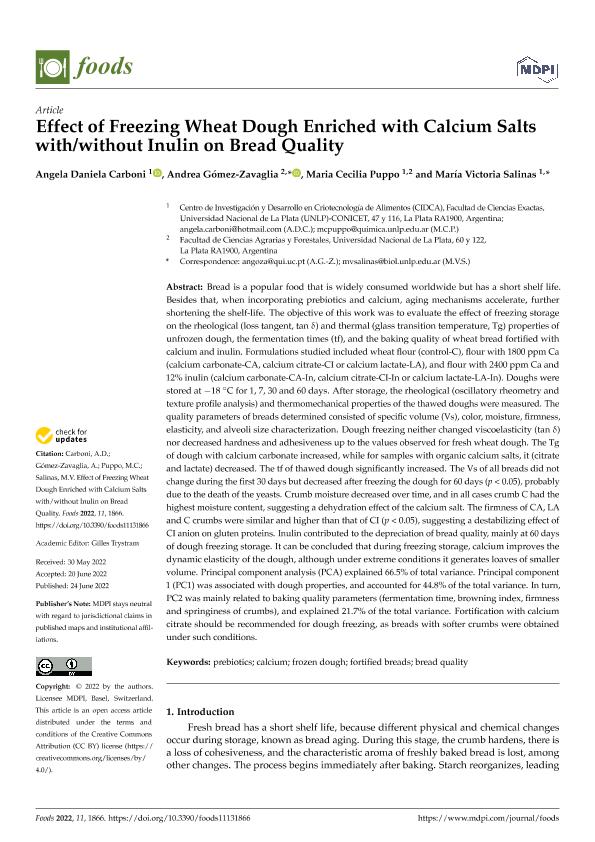Mostrar el registro sencillo del ítem
dc.contributor.author
Carboni, Angela Daniela

dc.contributor.author
Gomez Zavaglia, Andrea

dc.contributor.author
Puppo, Maria Cecilia

dc.contributor.author
Salinas, Maria Victoria

dc.date.available
2023-07-10T13:34:39Z
dc.date.issued
2022-07
dc.identifier.citation
Carboni, Angela Daniela; Gomez Zavaglia, Andrea; Puppo, Maria Cecilia; Salinas, Maria Victoria; Effect of Freezing Wheat Dough Enriched with Calcium Salts with/without Inulin on Bread Quality; MDPI; Foods; 11; 13; 7-2022; 1-17
dc.identifier.issn
2304-8158
dc.identifier.uri
http://hdl.handle.net/11336/202895
dc.description.abstract
Bread is a popular food that is widely consumed worldwide but has a short shelf life. Besides that, when incorporating prebiotics and calcium, aging mechanisms accelerate, further shortening the shelf‐life. The objective of this work was to evaluate the effect of freezing storage on the rheological (loss tangent, tan δ) and thermal (glass transition temperature, Tg) properties of un-frozen dough, the fermentation times (tf), and the baking quality of wheat bread fortified with calcium and inulin. Formulations studied included wheat flour (control‐C), flour with 1800 ppm Ca (calcium carbonate‐CA, calcium citrate‐CI or calcium lactate‐LA), and flour with 2400 ppm Ca and 12% inulin (calcium carbonate‐CA‐In, calcium citrate‐CI‐In or calcium lactate‐LA‐In). Doughs were stored at −18 °C for 1, 7, 30 and 60 days. After storage, the rheological (oscillatory rheometry and texture profile analysis) and thermomechanical properties of the thawed doughs were measured. The quality parameters of breads determined consisted of specific volume (Vs), color, moisture, firmness, elasticity, and alveoli size characterization. Dough freezing neither changed viscoelasticity (tan δ) nor decreased hardness and adhesiveness up to the values observed for fresh wheat dough. The Tg of dough with calcium carbonate increased, while for samples with organic calcium salts, it (citrate and lactate) decreased. The tf of thawed dough significantly increased. The Vs of all breads did not change during the first 30 days but decreased after freezing the dough for 60 days (p < 0.05), probably due to the death of the yeasts. Crumb moisture decreased over time, and in all cases crumb C had the highest moisture content, suggesting a dehydration effect of the calcium salt. The firmness of CA, LA and C crumbs were similar and higher than that of CI (p < 0.05), suggesting a destabilizing effect of CI anion on gluten proteins. Inulin contributed to the depreciation of bread quality, mainly at 60 days of dough freezing storage. It can be concluded that during freezing storage, calcium improves the dynamic elasticity of the dough, although under extreme conditions it generates loaves of smaller volume. Principal component analysis (PCA) explained 66.5% of total variance. Principal component 1 (PC1) was associated with dough properties, and accounted for 44.8% of the total var-iance. In turn, PC2 was mainly related to baking quality parameters (fermentation time, browning index, firmness and springiness of crumbs), and explained 21.7% of the total variance. Fortification with calcium citrate should be recommended for dough freezing, as breads with softer crumbs were obtained under such conditions.
dc.format
application/pdf
dc.language.iso
eng
dc.publisher
MDPI
dc.rights
info:eu-repo/semantics/openAccess
dc.rights.uri
https://creativecommons.org/licenses/by/2.5/ar/
dc.subject
BREAD QUALITY
dc.subject
CALCIUM
dc.subject
FORTIFIED BREADS
dc.subject
FROZEN DOUGH
dc.subject
PREBIOTICS
dc.subject.classification
Alimentos y Bebidas

dc.subject.classification
Otras Ingenierías y Tecnologías

dc.subject.classification
INGENIERÍAS Y TECNOLOGÍAS

dc.title
Effect of Freezing Wheat Dough Enriched with Calcium Salts with/without Inulin on Bread Quality
dc.type
info:eu-repo/semantics/article
dc.type
info:ar-repo/semantics/artículo
dc.type
info:eu-repo/semantics/publishedVersion
dc.date.updated
2023-07-07T18:34:11Z
dc.journal.volume
11
dc.journal.number
13
dc.journal.pagination
1-17
dc.journal.pais
Suiza

dc.description.fil
Fil: Carboni, Angela Daniela. Provincia de Buenos Aires. Gobernación. Comisión de Investigaciones Científicas. Centro de Investigación y Desarrollo en Criotecnología de Alimentos. Consejo Nacional de Investigaciones Científicas y Técnicas. Centro Científico Tecnológico Conicet - La Plata. Centro de Investigación y Desarrollo en Criotecnología de Alimentos. Universidad Nacional de La Plata. Facultad de Ciencias Exactas. Centro de Investigación y Desarrollo en Criotecnología de Alimentos; Argentina
dc.description.fil
Fil: Gomez Zavaglia, Andrea. Provincia de Buenos Aires. Gobernación. Comisión de Investigaciones Científicas. Centro de Investigación y Desarrollo en Criotecnología de Alimentos. Consejo Nacional de Investigaciones Científicas y Técnicas. Centro Científico Tecnológico Conicet - La Plata. Centro de Investigación y Desarrollo en Criotecnología de Alimentos. Universidad Nacional de La Plata. Facultad de Ciencias Exactas. Centro de Investigación y Desarrollo en Criotecnología de Alimentos; Argentina
dc.description.fil
Fil: Puppo, Maria Cecilia. Provincia de Buenos Aires. Gobernación. Comisión de Investigaciones Científicas. Centro de Investigación y Desarrollo en Criotecnología de Alimentos. Consejo Nacional de Investigaciones Científicas y Técnicas. Centro Científico Tecnológico Conicet - La Plata. Centro de Investigación y Desarrollo en Criotecnología de Alimentos. Universidad Nacional de La Plata. Facultad de Ciencias Exactas. Centro de Investigación y Desarrollo en Criotecnología de Alimentos; Argentina. Universidad Nacional de La Plata. Facultad de Ciencias Agrarias y Forestales; Argentina
dc.description.fil
Fil: Salinas, Maria Victoria. Provincia de Buenos Aires. Gobernación. Comisión de Investigaciones Científicas. Centro de Investigación y Desarrollo en Criotecnología de Alimentos. Consejo Nacional de Investigaciones Científicas y Técnicas. Centro Científico Tecnológico Conicet - La Plata. Centro de Investigación y Desarrollo en Criotecnología de Alimentos. Universidad Nacional de La Plata. Facultad de Ciencias Exactas. Centro de Investigación y Desarrollo en Criotecnología de Alimentos; Argentina
dc.journal.title
Foods
dc.relation.alternativeid
info:eu-repo/semantics/altIdentifier/doi/http://dx.doi.org/10.3390/foods11131866
dc.relation.alternativeid
info:eu-repo/semantics/altIdentifier/url/https://www.mdpi.com/2304-8158/11/13/1866
Archivos asociados
